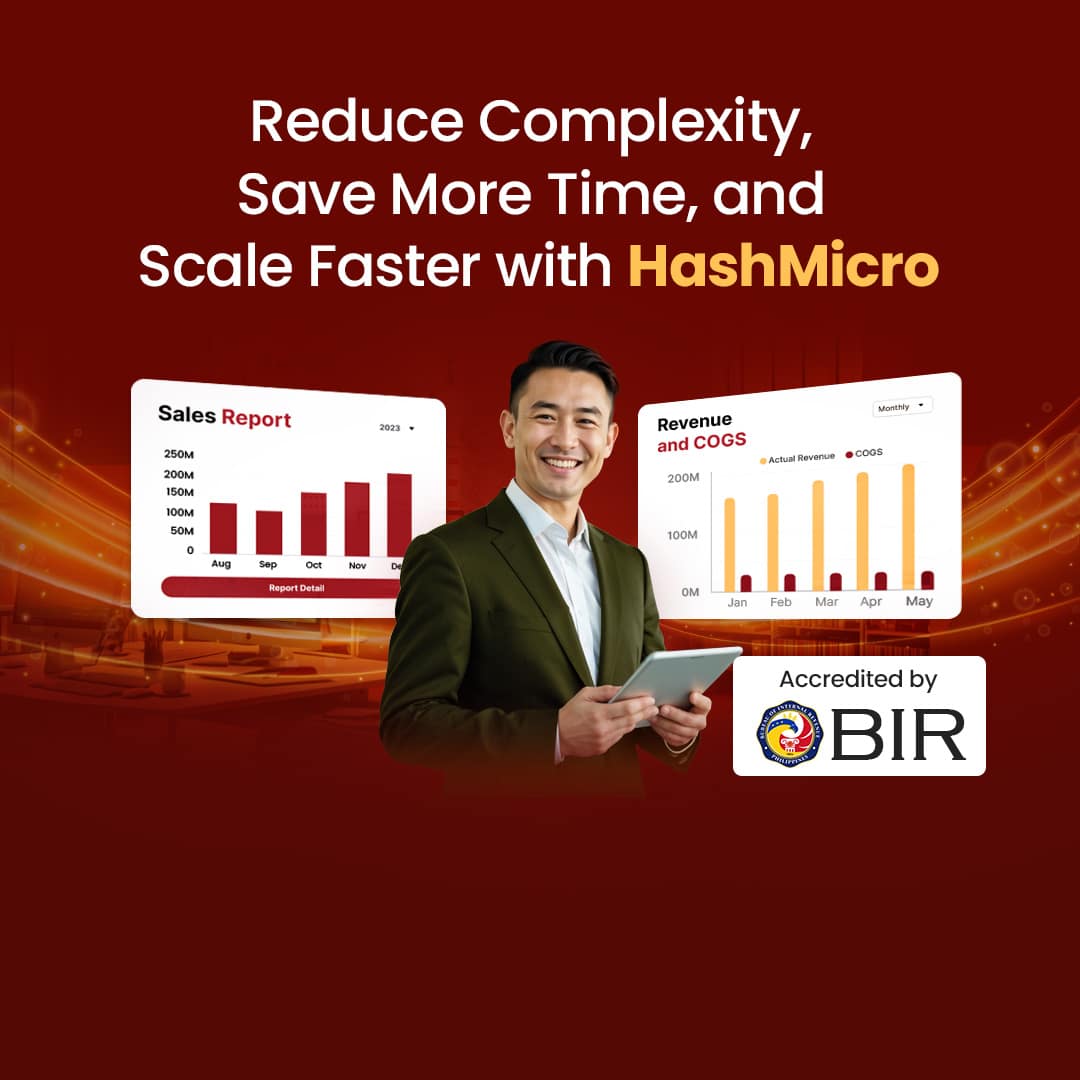The use of ERP Systems in the Philippines is now increasing daily. This phenomenon aims to become a common practice that every business leader should follow. Bakit ito nangyayari?
A study found that distribution software increased productivity by 25% and streamlined order fulfilment by 50% as part of the ERP system. Hay naku! This is not a small amount because an ERP system can significantly improve your company’s reputation and profits.
Therefore, it is essential to know which vendors provide the best distribution ERP software in the Philippines. Here, we summarize the best eight of them, complete with features, weaknesses, advantages, and tips on choosing the right vendor.
Key Takeaways
|
Table of Contents

What is Distribution ERP Software?
Distribution ERP software is a digital solution that helps businesses manage and optimize their distribution processes. This software efficiently handles inventory management, order processing, procurement, and shipping by integrating various functions into a single system.
Additionally, the software includes warehouse management and analytics capabilities that provide real-time insights into operational performance. By leveraging distribution ERP software, companies can enhance efficiency, lower costs, and improve customer service, supporting business growth and sustainability.
Why Do You Need Distribution ERP Software For Your Business?
Business leaders, if your company struggles with manual processes, inaccurate inventory, or delayed orders, you’re not alone. Many business people face these challenges, hindering company growth and customer satisfaction. That is why distribution ERP software comes into play.
Without distribution ERP solutions, businesses often encounter significant challenges in their warehouses. Inefficient inventory management can lead to stockouts or overstocking, causing lost sales or excess carrying costs. Surely you don’t want this mess to happen to your business, diba?
Therefore, the first step before choosing the best ERP vendor is to know your business capacity and the implementation budget that you can afford. One way is to use a software pricing scheme like the one below. This will help you determine scalability and the funding needed to implement a distribution management system.
9 Benefits of Distribution ERP for Your Company
Implementing a Philippines distribution centre using ERP software can transform your business operations and drive growth. Here are some key benefits:
- Increased efficiency by automating processes and reducing manual work
- Provides up-to-date information on stock levels
- Minimizes errors in order processing and fulfilment
- Enhanced reporting and analytics
- Optimizes inventory and reduces carrying costs
- Enables faster response times and accurate order tracking
- Supports business growth and adapts to changing needs
- Facilitates better collaboration with suppliers and partners
- Helps meet regulatory requirements and manage risks effectively
Must-Have Features of Distribution ERP Software
- Inventory Management: Distribution ERP software provides real-time access to inventory, helping users manage stock with features like cycle counting, demand forecasting, and ABC or VED analysis. This allows accurate inventory control, demand prediction using sales data, and prioritization of stock categories for optimal purchasing and distribution strategies.
- Sales and Order Management: An ERP for wholesale distributors enhances the sales process and fulfils orders with tools for automating orders, managing customer quotes, and controlling backorders. Users can generate accurate quotes, manage order statuses in real-time, set credit limits, and streamline order processing to reduce errors and speed up fulfilment.
- Supply Chain Management: Distribution ERP improves collaboration and transparency in the supply chain with features for supplier management, drop shipping, and logistics optimization. It tracks supplier performance, automates purchase orders, provides real-time shipment updates, and enables dropshipping directly from warehouses.
- Financial Management: ERP simplifies financial management by automating accounts payable/receivable and providing real-time data. Features include financial reporting, cost tracking, landed cost analysis, and managing discounts or rebates based on volume and contracts.
- Warehouse Management: Distribution ERP software improves warehouse operations with tools like warehouse slotting, barcode scanning, and integration with a Warehouse Management System (WMS). It optimizes layout, speeds up order fulfilment, and enhances control over multiple warehouses.
- Customer Relationship Management (CRM): Distribution ERPs help build strong customer relationships with features like distributor management, contract management, targeted promotions, and self-service portals. These tools allow businesses to analyze client data, create custom promotions, manage contracts, and offer self-service options to reduce administrative work.
- Integration Capabilities: Distribution ERPs integrate with other systems, such as Transportation Management Systems (TMS) for logistics, Business Intelligence tools for data analysis, and B2B e-commerce platforms to streamline distribution operations.
Top 8 Distribution ERP Software in the Philippines 2025
After discovering the benefits of the distribution of ERP software in the Philippines, we will move to the recommendation section. In addition to the software’s distribution warehouse type, here we explore eight of the best ERP solutions to transform your distribution operations generally.
1. HashMicro Distribution ERP Software
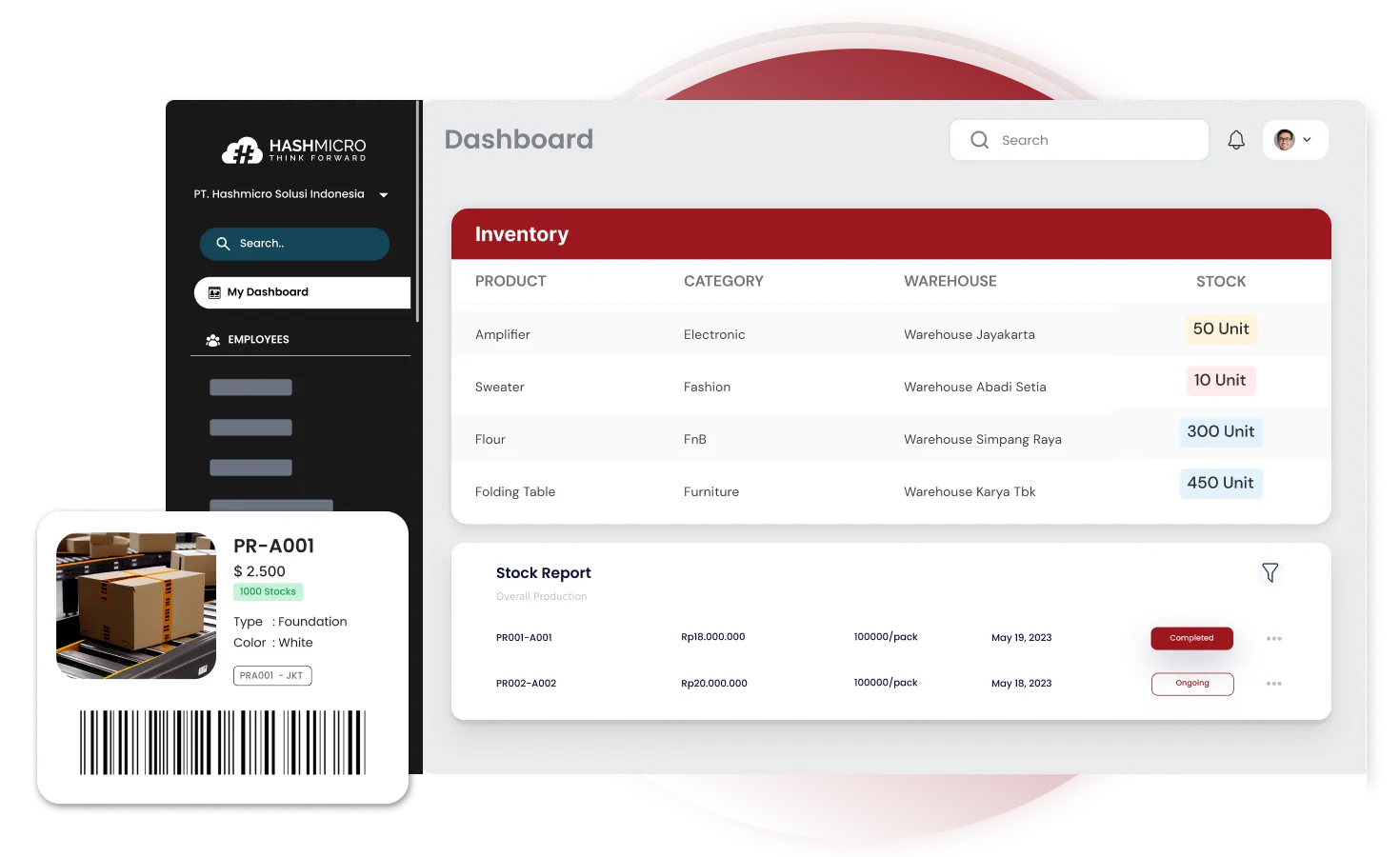 Why we chose: We chose HashMicro because of its seamless integration of RFID and barcode technologies, which makes inventory management efficient and straightforward.
Why we chose: We chose HashMicro because of its seamless integration of RFID and barcode technologies, which makes inventory management efficient and straightforward.
HashMicro is a top distribution ERP software provider in Southeast Asia. It is known for its unified platform that integrates RFID warehouse management and barcode scanning, making it a preferred choice among reliable business professionals.
Over 1750 companies, including Oishi, Tate & Lyle, Toyota, and Forbes, have selected HashMicro due to its user-friendly interface and extensive functionalities. To ensure customer satisfaction, HashMicro offers a free demo, allowing potential users to assess the reliability of its system for their specific needs.
Key features:
- RFID warehouse rack stock in out automation: The use of RFID technology to automate tracking the movement of stock in and out of warehouse shelves.
- 3D warehouse: A digital model that provides visual information of a warehouse’s layout, storage capacity, and inventory status that looks exactly like its physical form.
- Stock forecasting: A system that analyzes historical sales data, seasonal trends, and other factors to predict future demand for goods.
- Fast, slow, and non-moving stock analysis: It helps identify products in the warehouse with high and low turnover rates to enable strategic planning, such as prioritizing stock procurement, creating sales promotions, eliminating unsold items, etc.
- Quality control management is another module often used with the inventory system to ensure that the goods stored, processed, and shipped meet the set quality standards.
- Stock optimizer per warehouse: Maximize overall warehouse space usage and improve operational efficiency in stock management.
|
Pros |
Cons |
| Intuitive user interface | There was a long queue for the free demo due to the high demand from Filipino businesses. |
| Excellent customer support | |
| Customizable modules | |
| Strong reporting capabilities |
2. SAP Business One
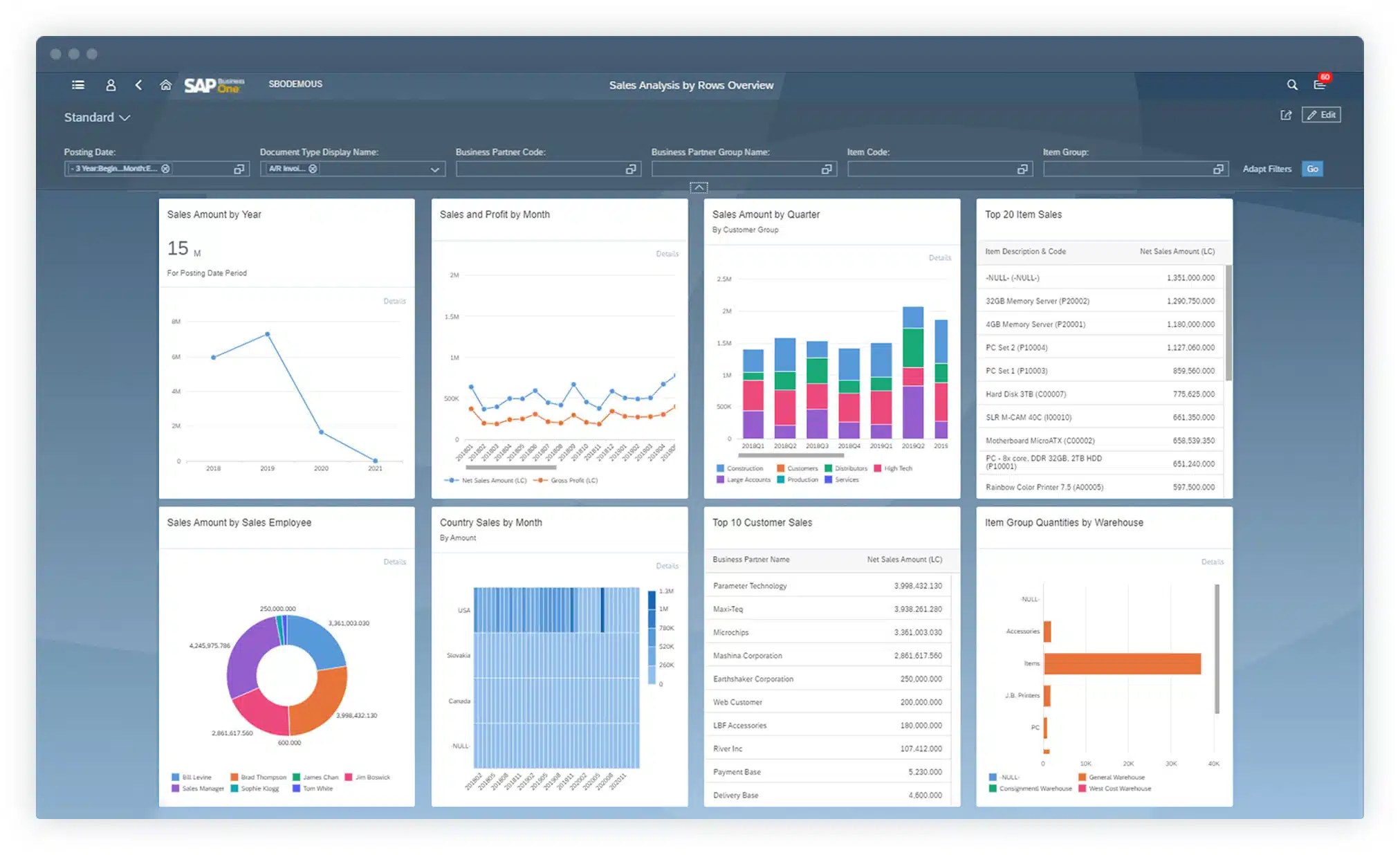 Why we choose: We opt for SAP Business One due to its comprehensive suite of tools that empower informed decision-making and streamline operations.
Why we choose: We opt for SAP Business One due to its comprehensive suite of tools that empower informed decision-making and streamline operations.
SAP Business One is a distribution ERP solution for small and medium enterprises. It integrates various business functions into a single system, allowing real-time data access and improved decision-making. This software for distributors is designed to streamline operations and empower businesses to enhance efficiency.
Key features:
- Integrated business intelligence
- Financial management
- Supply chain management
- Production planning
|
Pros |
Cons |
| Comprehensive functionality | Complex implementation process |
| Robust analytics and reporting tools | The steep learning curve for users |
| Extensive customization options | Higher upfront costs |
| Excellent integration capabilities | It may require ongoing support and maintenance |
3. Oracle NetSuite
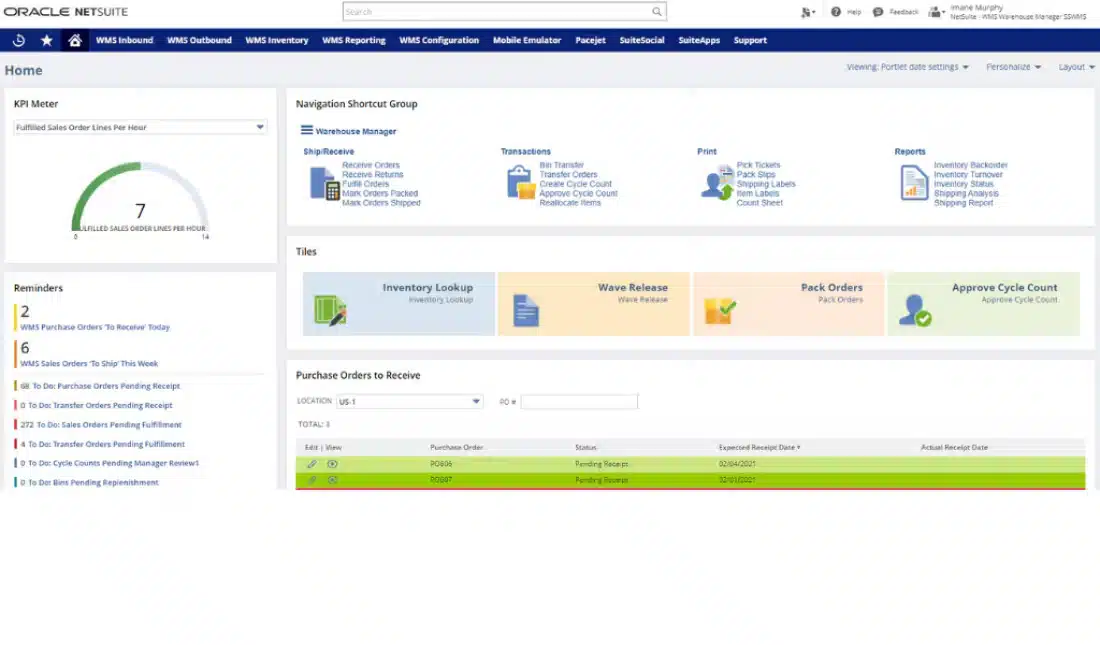 We choose Oracle NetSuite for its unparalleled scalability and real-time insights that drive strategic growth across multiple business areas.
We choose Oracle NetSuite for its unparalleled scalability and real-time insights that drive strategic growth across multiple business areas.
Oracle NetSuite is a cloud-based ERP solution that provides a unified system for managing all business aspects. It is known for its scalability and flexibility, which makes it ideal for growing companies. With its comprehensive features, businesses can adapt the software to their evolving needs.
Key features:
- Real-time data and analytics
- E-commerce integration
- Customer Relationship Management (CRM)
- Multi-currency management
|
Pros |
Cons |
| Highly scalable | Price can escalate with added features |
| Strong customization capabilities | Requires internet connectivity |
| Robust reporting tools | Complex interface for new users |
| Global compliance features | It may require dedicated IT resources |
4. Microsoft Dynamics 365
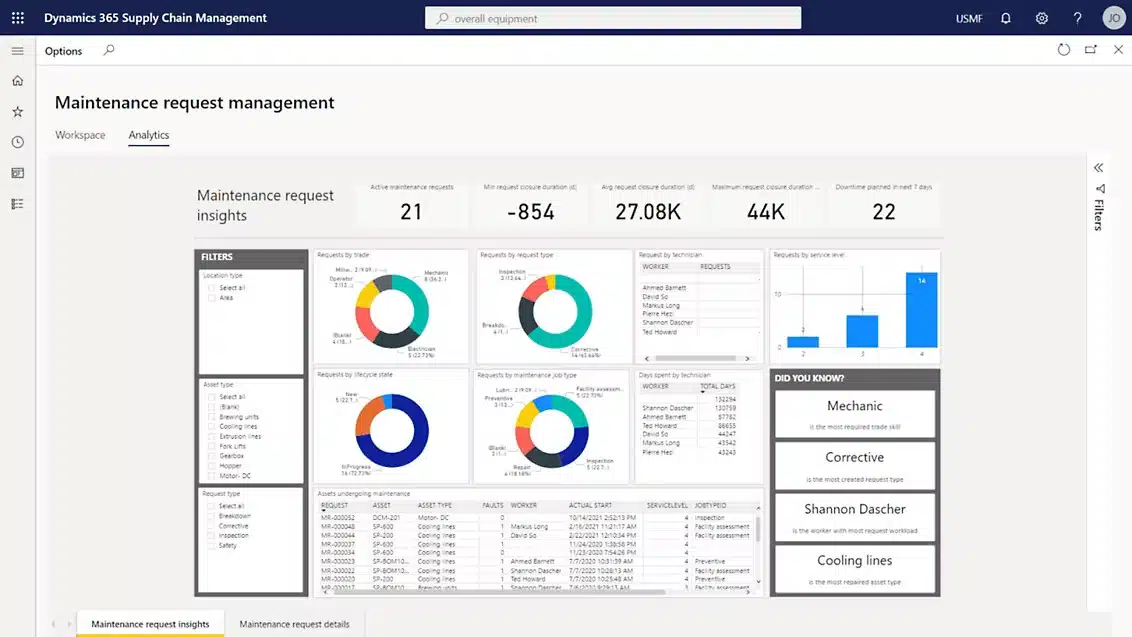 Why we choose: We favour Microsoft Dynamics 365 for its cohesive ecosystem that enhances collaboration and boosts overall productivity.
Why we choose: We favour Microsoft Dynamics 365 for its cohesive ecosystem that enhances collaboration and boosts overall productivity.
Microsoft Dynamics 365 offers a distribution ERP software suite that enables organizations to manage operations more efficiently. Its cloud-based platform seamlessly integrates various business functions, allowing teams to collaborate effectively and access real-time data for informed decision-making.
Key features:
- Unified operations
- Financial management
- Customer engagement
- Project management
|
Pros |
Cons |
| Strong integration with Microsoft products | It can be costly for small businesses |
| Flexible and customizable | It may require technical expertise |
| Excellent user interface | Frequent updates can disrupt workflow |
| Extensive partner ecosystem | Potential performance issues at scale |
5. Infor Wholesale ERP
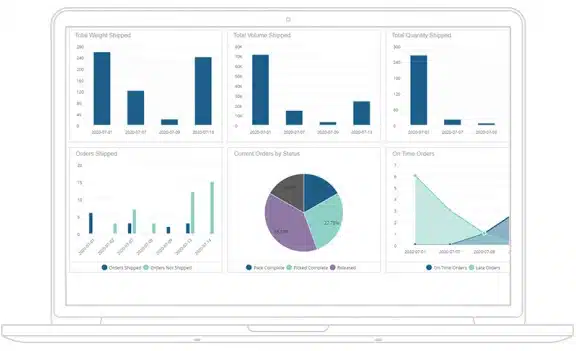
Why we choose: We appreciate Infor’s industry-specific solutions, which cater to unique distribution challenges and ensure tailored functionality and support.
Infor specializes in industry-specific solutions and delivers systems, such as supply chain and food ERP distribution software, that cater to the unique needs of distribution companies. Its user-friendly interface and powerful analytics capabilities help businesses drive efficiency.
Key features:
- Supply chain planning
- Warehouse management
- Wholesale ERP analytics and reporting
- Financial management
|
Pros |
Cons |
| Industry-specific functionality | Integration with existing systems can be challenging |
| Intuitive user experience | Limited global support options |
| Strong analytics tools | Customization may require additional costs |
| Regular updates and improvements | The learning curve for advanced features |
6. Epicor Distribution ERP Software
Why we choose: We choose Epicor because of its robust manufacturing focus, which seamlessly integrates with distribution processes to enhance operational efficiency.
Epicor provides ERP solutions tailored to the manufacturing and distribution sectors. With a strong focus on industry-specific needs, Epicor empowers businesses to enhance their efficiency and adapt to changing market demands.
Key features:
- Inventory control
- Supply chain management
- Financial management
- Production management
|
Pros |
Cons |
| Strong focus on manufacturing | It can be expensive for small businesses |
| Comprehensive training resources | Complex interface for non-technical users |
| Flexible deployment options | Implementation can take time |
| Good community support | Limited customization in certain areas |
7. Odoo Sales and Distribution ERP
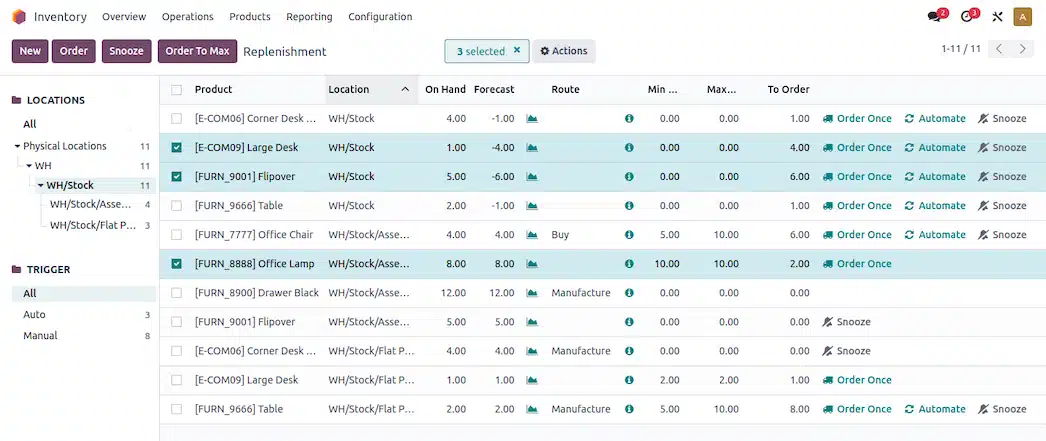 Why we choose: We choose Odoo for its modular flexibility, allowing businesses to customize their ERP system to fit their precise needs effortlessly.
Why we choose: We choose Odoo for its modular flexibility, allowing businesses to customize their ERP system to fit their precise needs effortlessly.
Odoo is an open-source food ERP distribution software known for its modularity and flexibility. It allows businesses to choose from various applications to create a tailored system. This adaptability makes it an attractive option for companies looking to scale and customize their distribution as they grow.
Key features:
- Modular applications
- CRM, sales, and distribution ERP management
- Inventory management
- Project management
|
Pros |
Cons |
| Highly customizable | Requires technical knowledge for setup |
| Cost-effective for small businesses | Some modules may lack advanced features |
| Active community support | The user interface can be inconsistent |
| Regular updates and improvements | Integration with third-party apps can be tricky |
8. Acumatica
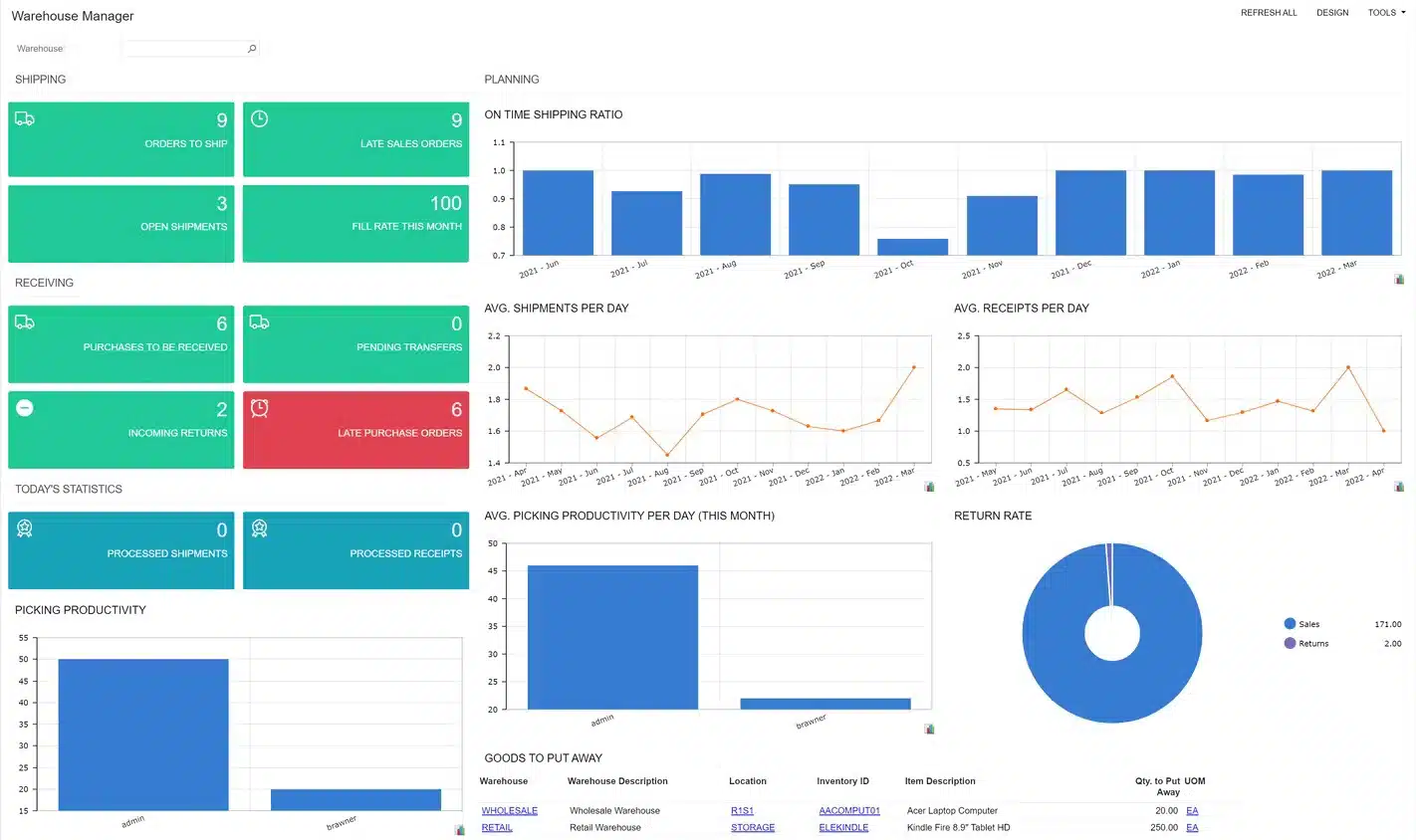 Why we choose: We prefer Acumatica ERP for its intuitive interface and cloud capabilities that empower teams to manage operations effectively from anywhere.
Why we choose: We prefer Acumatica ERP for its intuitive interface and cloud capabilities that empower teams to manage operations effectively from anywhere.
Acumatica is a cloud-based distribution ERP software offering various features designed to improve business processes and enhance visibility. Additionally, Acumatica’s scalability allows businesses to grow and adapt their distribution solutions as their needs evolve.
Key features:
- Financial management
- Customer management
- Project accounting
- Inventory management
|
Pros |
Cons |
| User-friendly interface | It may lack some advanced features |
| Strong integration capabilities | Pricing structure can be complex |
| Excellent mobile accessibility | Limited customization options |
| Regular updates and support | The learning curve for new users |
Also read: Top 12 Acumatica ERP Alternatives & Competitors in 2025
How to Choose the Best Distribution ERP Software
 Choosing the best distribution ERP software for your business is crucial for optimizing operations and enhancing efficiency. Here’s a guide to help you make the right choice:
Choosing the best distribution ERP software for your business is crucial for optimizing operations and enhancing efficiency. Here’s a guide to help you make the right choice:
- Identify your needs: Assess your current processes and pain points to determine which features are essential, such as inventory management and order processing.
- Consider scalability: Offer additional features or modules to ensure the software can grow with your business and adapt to changing needs.
- Read reviews and case studies: Look for feedback from other users to understand the software’s strengths and weaknesses, and review case studies for insights.
- Evaluate integration capabilities: Check if the software can seamlessly connect with your existing systems, like accounting and CRM, to minimize disruptions.
- Check for compliance features: To mitigate risks and avoid potential penalties, ensure the software complies with industry regulations relevant to your business.
- Analyze costs: Compare wholesale ERP pricing models, including upfront costs and ongoing fees, and consider the total cost of ownership, including implementation and maintenance.
- Request a demo: Request a live demonstration to see the software in action, understand its functionality, and see how it fits your needs.
Conclusion
Business leaders, utilizing distribution ERP software is essential for businesses in the Philippines that aim to enhance efficiency and streamline operations. With numerous options available, choosing the right vendor is crucial.
Among the many offerings, HashMicro stands out as a promising choice. It provides robust features tailored to distributors’ unique needs. If you want to explore how HashMicro can transform your business, you can try its free demo to see firsthand how it can benefit your operations.

FAQ About Distribution ERP Software
-
What is distribution system software?
Software distribution involves sharing software with users. This can be achieved by providing source code, which contains instructions that are easy for humans to read, or by distributing compiled object code, which can be executed directly by a computer.
-
What is an example of a distribution system?
For instance, a brewery that produces its beer and sells it directly to customers at its physical location uses a direct distribution channel. In this case, the seller provides the product or service straight to the consumers.
-
What is the purpose of a distribution system?
Distribution systems refer to the organized sequence of processes, systems, and activities that are structured and interconnected to support and oversee the transfer of goods and services from their origin to the consumer.





